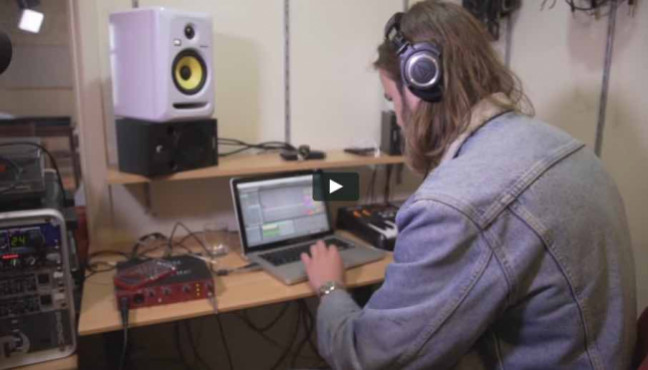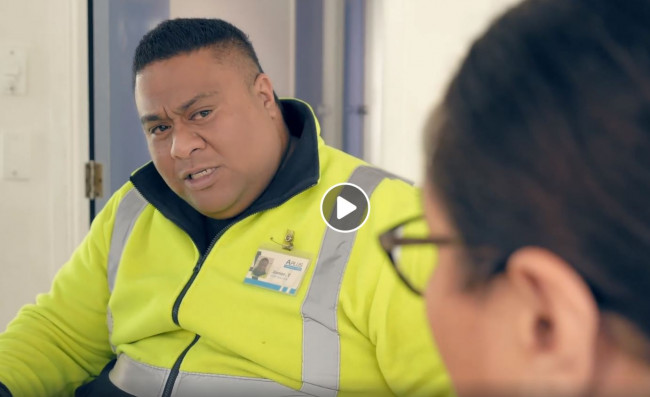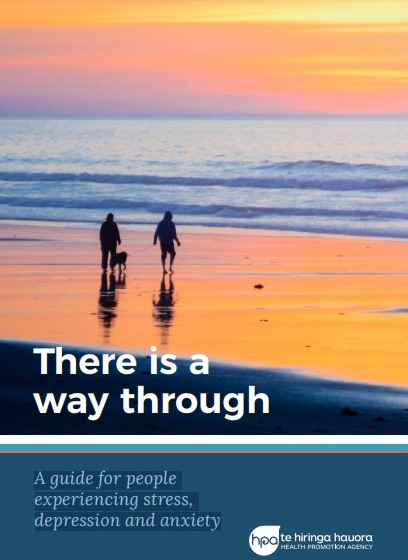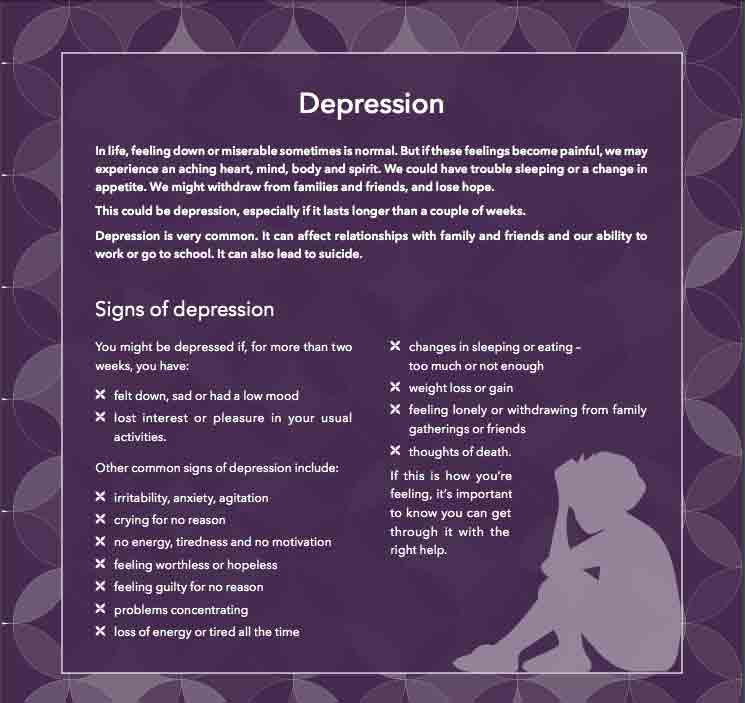- Depression is very common and can affect anyone, at any age – from childhood through to old age. It’s not a sign of any kind of weakness or fault in you. About 1 in 6 people experience depression at some time in their life. It affects women more than men, but men seem less likely to recognise the problem and seek help.
- Key symptoms include constantly feeling down or hopeless, loss of enjoyment or interest in doing the things you used to enjoy doing, negative thinking and sleep problems. You may feel so bad that you have thoughts of self-harm or even suicide.
- Symptoms can range from mild to severe, and the support and treatment you need will depend on how severe your symptoms are.
- Depression can usually be treated with a combination of psychological therapies, lifestyle changes and antidepressant medication.
- If you’re depressed, it’s important to get help – the sooner you do, the sooner you'll start to feel better. Remember: there is hope. Many people have come out the other side of depression and have gone on to enjoy happy, healthy lives.
Low or no data? Visit zero.govt.nz, scroll down the page then click on our logo to return to our site and browse for free.
Depression | Mate pāpouri
Key points about depression
- We all have the blues from time to time, but if you have depression (mate pāpouri), this feeling is stronger.
- It affects your thinking and behaviour, and lasts from weeks to months.
- However, no matter how low you feel, there is hope.
- There are people who can help you and things you can do to get on the road to recovery.

Video: What is depression? - Helen M. Farrell
Depression is a change in mood, behaviour and feelings that can be mild, moderate or severe. Symptoms include:
- low mood
- frequently feeling sad and tearful
- not wanting to socialise anymore
- being unable to enjoy activities that once were fun
- feeling stressed and anxious
- poor appetite or overeating
- physical symptoms such as pain (eg, headache, back pain)
- tiredness and too much or too little sleep
- difficulty concentrating and making decisions
- not thinking straight
- difficulty getting much done.
If your depression is more severe, you may also have thoughts of self-harm or suicide. If you have these thoughts, you should get help urgently from your doctor or one of the helplines listed on this page. There are people who can help you get through. Read more about severe depression.
Sometimes depression appears out of the blue, while at other times something seems to trigger it. The exact cause of depression is unknown but many factors may play a role in depression. For example, you are more likely to experience depression if you:
- have someone in your family who has been depressed, such as a parent or sibling
- experienced trauma or abuse at an early age
- have certain chronic physical health conditions, such as diabetes, cancer, heart disease, Parkinson’s disease or coeliac disease, or have had a stroke or have low thyroid hormone
- are going through major life changes or have recently suffered a loss, such as a relationship break-up, redundancy, or a significant injury or accident
- are LGBTI
- are or have just been pregnant
- are an older adult
- use alcohol or recreational drugs
- are taking certain medicines, such as for blood pressure or hormonal medication.
If you are unsure whether you have depression, there are online self-tests you can do, including:
If you have some, but not necessarily all, the symptoms mentioned above, it’s a good idea to see your doctor. They will ask you questions about your thoughts, feelings and behaviour, including sleeping and eating patterns, as well as how long you have been feeling this way. They will also ask if you have had any previous episodes of depression and may ask about what is happening in your life at the moment. They may also do a physical examination and blood tests to rule out other causes for your depression.
Your doctor will be assessing not only if you have depression, but what type of depression and whether you have mild, moderate or severe symptoms, as this will affect what treatment they recommend.
There are several types of depression. You can still be depressed even if you don't meet all the criteria for one of these types. The Diagnostic and Statistical Manual of Mental Disorders (DSM-5) divides depression into the following categories:
- Major depressive disorder – depression symptoms that interfere with your ability to work, sleep, study, eat and enjoy life. These may be mild, moderate or severe.
- Persistent depressive disorder – a depressed mood that lasts for at least 2 years.
- Premenstrual dysphoric disorder – a severe form of premenstrual syndrome experienced by some women before their periods.
- Other depressive disorders – not meeting major depressive disorder criteria due to substance abuse, medication side effects, medical conditions, or other specified or unspecified reasons.
Other conditions also include symptoms of depression, such as the following:
- Postpartum depression – a type of depression that some women experience after giving birth.
- Seasonal affective disorder (SAD) – depression during the winter months, when there is less natural sunlight.
- Bipolar disorder – different from depression, but includes episodes of extreme low moods as well as extreme high moods (mania).
Major depressive disorder
For a diagnosis of major depressive disorder, you will have experienced five or more of the following symptoms during the same 2-week period and this is a change from your previous functioning. At least one of your symptoms is either depressed mood or loss of interest or pleasure:
- depressed mood most of the day, nearly every day, as self-reported or observed by others
- diminished interest or pleasure in all or almost all activities most of the day, nearly every day
- significant weight loss when not dieting, weight gain, or decrease or increase in appetite nearly every day
- insomnia or hypersomnia nearly every day
- psychomotor agitation or retardation nearly every day
- fatigue or loss of energy nearly every day
- feelings of worthlessness or excessive or inappropriate guilt nearly every day
- diminished ability to think or concentrate nearly every day
- recurrent thoughts of death, recurrent suicidal ideation without a specific plan.
In addition, these symptoms:
- cause functional impairment (e.g., social, occupational)
- are not better explained by substance abuse, medication side effects or other psychiatric or somatic medical conditions.
There are 3 levels of severity of major depression defined in the DSM-5:
Mild depression: Few, if any, symptoms in excess of the 5 required to make the diagnosis, and symptoms result in only minor functional impairment.
Moderate depression: Symptoms or functional impairment are between mild and severe.
Severe depression: Most symptoms, and the symptoms markedly interfere with functioning. Can occur with or without psychotic symptoms. Read more about severe depression.
Persistent depressive disorder
For this diagnosis, you meet the above criteria for a major depressive disorder, or you have 3 or 4 of the following dysthymic symptoms including depressed mood, for 2 years or more. Your impairment compared with major depressive disorder may be less severe. Dysthymic symptoms are as follows:
- depressed mood
- appetite changes
- sleep changes
- low self-esteem
- fatigue
- poor concentration
- hopelessness.
Depression can usually be effectively treated with a combination of psychological therapy, lifestyle changes and antidepressant medication. For Māori, an approach based on a Māori model of health has a more holistic understanding of wellbeing. For some people, alternative approaches have been useful, such as mindfulness meditation, St John's wort and online tools and courses.
Psychological therapy
If you have depression, especially if it is severe, it’s a good idea to have some form of face-to-face psychological (talking) therapy. Counselling or psychotherapy can help you with your thinking patterns and anxiety, problem-solving skills and self-esteem, among other things. Psychological therapy from a trained professional can help you recover and can reduce the chances of future bouts of depression. A number of psychotherapy approaches have been found to be helpful with depression, including cognitive behavioural therapy (CBT). You can ask your GP to recommend someone or find a counsellor(external link) yourself.
This video gives an idea of what cognitive behavioural therapy is and what to expect from it.

(external link)
(Werry Workforce, NZ, 2019)
Lifestyle changes
Looking after your physical health(external link) is an important way to improve your mental health. Improvements to four aspects of your daily life can greatly reduce your depression: sleep, exercise, diet and the use of alcohol or other recreational drugs.
Sleep
Insomnia is closely associated with many mental illnesses, both as a symptom and a potential trigger. It co-occurs most commonly in major depression with around 80% of people diagnosed with depression experiencing insomnia.
Good sleep can improve your mood and also give you more resources for coping with life’s challenges. Find out about why sleep is important and check out these sleep tips or sleep apps. You could also try SHUTi(external link), an evidence-based CBT programme for insomnia that has been shown to reduce depression (Note: there is a fee). If you are still having problems with your sleep, talk to your doctor about it.
Physical activity
People who are inactive are up to twice as likely to have depressive symptoms than active people. Even one hour of exercise a week has been found to prevent depression.
Find out more about physical activity and mental health and the general benefits of being active.
Diet
What we put into our bodies effects not only our physical health but also our mental wellbeing. A direct link has been found between diet and depression. Find out about healthy eating basics to make sure your diet is providing you with the nutrients to help keep depression at bay.
Alcohol and other recreational drugs
It’s important to avoid using alcohol and other drugs as these can often make depression worse. You may feel like they give you a lift in mood, but the overall effect is to make things worse. Read more about alcohol and mental health.
Antidepressant medications
Antidepressants are generally reserved for people with moderate to severe depression, where psychological therapy and lifestyle changes have not been enough for the depression to go away. They work best when used together with psychological therapy and lifestyle changes.
Antidepressants are not routinely used for people with mild depression because psychological therapy and lifestyle changes usually work well for mild symptoms. However, if your doctor recommends antidepressants, they will review with you regularly as to how well they are working, whether your dose needs adjusting or you need a different medication, and to work out when you are ready to start coming off them.
- There are various classes of antidepressants. The most commonly used antidepressants for first-time treatment are selective serotonin re-uptake inhibitors (or SSRIs), such as citalopram, escitalopram, sertraline and fluoxetine. These work best when used together with psychological therapy and lifestyle changes. Most people will start noticing an improvement within 2 or 3 weeks but it will take 6 months or longer to get the full benefit. If you have troublesome side effects or little improvement in your symptoms after 6 weeks, talk to your doctor about changing the dose or trying a different antidepressant (switching).
- It's normal to use antidepressants for up to a year, or longer if you have had depression before. Antidepressants are not addictive but coming off antidepressants should be done slowly, supervised by your doctor, to avoid withdrawal side effects. You should also talk to your doctor if you become pregnant or plan to become pregnant.
- Also, check with your doctor or pharmacist before taking any other medicines or supplements – some have interactions with antidepressants that increase the risk of psychological and physical problems, even ones bought over the counter at a pharmacy and some herbal medicines.
Find out more about antidepressants.
Māori models of care
For Māori, Western models of mental health and mental healthcare will not always be appropriate. An approach based on a Māori model of health has a more holistic understanding of wellbeing. For example, the four cornerstones (or sides) of Māori health in the Te Whare Tapa Whā model of health are:
- whānau (family health)
- tinana (physical health)
- hinengaro (mental health)
- wairua (spiritual health).
You can find a health practitioner who has a kaupapa Māori approach to wellbeing in this directory(external link).
Alternative approaches
Certain complementary therapies may enhance your life and help you to maintain wellbeing. In general, mindfulness, hypnotherapy, yoga, exercise, relaxation, massage, mirimiri massage and aromatherapy have all been shown to have some effect in alleviating mental distress.
Mindfulness
Mindfulness, the practice of being aware of each moment of your day as it happens, has been shown to be effective for some people with depression by helping to ease tension and promote calmness. You can learn how to do this from online courses such as Breathe(external link) or look for a group to go to in your area.
St John’s wort
Research has found that St John's wort is useful in the treatment of mild-to-moderate depression, but not effective in severe depression. The mechanism of action of St John’s wort is not fully understood but it is believed to affect certain chemicals in the body such as serotonin and noradrenaline, and, in this way, is thought to improve mood.
Many of the chemicals in St John's wort interact with medicines used to treat depression and other illnesses. It is important to let your doctor or pharmacist know if you want to try St John's wort so that they can check if it might interfere with other medicines you are taking.
Online tools and courses
For mild-to-moderate depression, online programmes can be useful and effective. Here are some well-researched programmes worth looking at:
- The Journal(external link) – a free personalised online programme to help you to stay positive, create lifestyle changes, and learn steps for problem-solving.
- Beating the Blues(external link) – an evidence-based online CBT tool for treating depression. Your doctor can provide access to this programme.
- Small Steps(external link) Whether you’re looking to maintain wellbeing, find relief or get help, Small Steps can support you and your whānau with practical tools, strategies and advice.
- SPARX(external link) – a free online tool to help young people learn to deal with depression and anxiety.
- myCompass(external link)– an Australian interactive self-help service that aims to promote resilience and wellbeing for mild to moderate stress, anxiety and depression
- MoodGYM(external link)and e-couch(external link)– cognitive behavioural therapy (CBT) based programmes from the Australian National University to help you identify and overcome problem emotions and develop good coping skills.
- Aunty Dee(external link) – free online tool to help you work through problems.
- Back from the bluez(external link) – an online course with strategies to help you manage your mood. Centre for Clinical Interventions, Australia,
- Depression course(external link) – an evidence-based online course for if you have had more than one episode of depression (Note: this course has a fee). This Way Up, Australia
- Structured problem solving(external link) – a workbook from depression.org.nz
- Small steps are the key to change – choose what feels manageable and build from there.
- Making your own self-care a priority builds your resilience so you can cope better with the challenges of life.
- Looking after your physical health helps your mental wellbeing.
- Having ways to reduce and manage stress increases your resilience.
- Getting help when you need it is a sign of strength, not weakness.
- Staying connected to family, whānau and friends can help you feel better.
- Spending time in nature is key to your wellbeing.
- Finding a purpose increases your sense of meaning and belonging.
Read more about Living well with depression.
In collaboration with WHO to mark World Mental Health Day, writer and illustrator Matthew Johnstone tells the story of overcoming the "black dog of depression".
Video: I had a black dog, his name was depression
This video may take a few moments to load.
(WHO, US, 2012)
It's understandable that when you're depressed low energy, loss of pleasure and increased anxiety get in the way of doing the things you used to enjoy. However, taking small steps back to those things can help you to live well with depression – and may even be the start of the way out of it too.
These videos show how you can take small steps back to those things, eg, by opening up to a friend, going for a walk, planting some veges, reading a book to the kids, listening to the sounds in the bush or opening the curtains to let the sun in.
Watch the videos below and read about living well with depression.
Video: Depression.org.nz - Campaign TVC 1
This video may take a few moments to load.
(depression.org.nz(external link), 2017)
Video: Depression.org.nz - Campaign TVC 2
This video may take a few moments to load.
(depression.org.nz(external link), 2017)
Video: Depression.org.nz - Campaign TVC 3
This video may take a few moments to load.
(depression.org.nz(external link), 2017)
For ongoing support for yourself, family/whānau or someone you know, contact:
- 1737(external link) Free call or text 1737 any time, 24 hours a day to talk or text with a trained counsellor
- Lifeline Aotearoa(external link) 24/7 counselling and support 0800 534 354
- Depression Helpline (0800 111 757)
- Samaritans (0800 726 666)
- Youthline (0800 376 633)
- Trusted mental health information(external link) Mental Health Foundation, NZ
- Expert information and support in response to elderly needs(external link) Age Concern, NZ
- Small Steps(external link) Whether you’re looking to maintain wellbeing, find relief or get help, Small Steps can support you and your whānau with practical tools, strategies and advice.
- Supporting families to mental wellbeing(external link) Yellow Brick Road, NZ
- Suicide Prevention Helpline(external link) 0508 828 865 (0508 TAUTOK0)
- Samaritans(external link) 0800 726 666 (24 hours, 7 days)
- Depression resources, chat and much more(external link) depression.org.nz
- The Journal - online self-help programme(external link) depression.org.nz
- Mental health crisis assessment teams(external link) (for emergencies only)
- Peer support groups and mindfulness programmes (Hamilton, Waikato)(external link) Evolve Peer Support Trust
Children and youth
- Helping young Kiwis understand and deal with depression(external link) The Lowdown NZ (or freetext 5626)
- SPARX(external link) helps young people learn skills to deal with feeling down, depressed or stressed
- Need to talk?(external link) Youthline NZ (0800 376 633 - or text 234)
- Kidsline(external link) 0800 543 754 (4pm–9pm weekdays)
- Whatsup(external link) Barnardos NZ (0800 WHATS UP)
- Support(external link) Skylight NZ (0800 299 100)
For help with specific issues
- OUTLine(external link) 0800 688 5463 (0800 OUTLINE) – for people with sexuality or gender identity issues
- Alcohol Drug Helpline(external link) 0800 787 797, free text 8681 or online chat – for people dealing with alcohol or other drug problems
- Rural Support(external link) 0800 787 254 – for people in rural communities
- Le Va(external link) – for Pasifika families
- Refugees as Survivors(external link) 0800 472 769 – for refugees and asylum seekers
- Support and services for mothers at-risk of or have developed postnatal depression(external link) Mothers Helpers NZ
This story video below is based on an actual lived experience that aims to encourage families to have healthy discussions on mental well-being and support.
Video: Just Ask. Just Listen.
This video may take a few moments to load.
 (external link)
(external link)
(Vaka Tautua, NZ, 2019)
1. Video: Don't be a know-it-all. Just ask. Just listen.
This video may take a few moments to load.
(Nōku te Ao: Like Minds, NZ, 2018)
2. Video: Name-calling doesn't help. Just ask. Just listen.
This video may take a few moments to load.
(Nōku te Ao: Like Minds, NZ, 2018)
3. Video: Get over the awkward. Just ask. Just listen.
This video may take a few moments to load.
(Nōku te Ao: Like Minds, NZ, 2018)
Video: Kindness helps someone with depression
The video below by Tangata Atumotu Trust shows how kindness helps support a person with depression. This may take a few moments to load. (external link)
(external link)
(Tangata Atumotu Trust, NZ, 2018)
Learn more
On this page you will find the following videos:
- Welcome by Eroni Clark
- Welcome by Dr Te Kani Kingi
- What depression and anxiety look like
- Suggestions for recovery
- Witi Ashby Tauparapara
- Kaumatua advice
- Dr Te Kani Kingi Whanaungatanga
- Traditional healing approaches
Video: Welcome by Eroni Clark
This video may take a few moments to load.
(Depression.org.nz, 2018)
Video: Kia ora, welcome to depression.org.nz by Dr Te Kani Kingi
This video may take a few moments to load.
(Depression.org.nz, 2016)
Video: What depression and anxiety looks like
The Pasifika communities living in Aotearoa come from many different cultures and speak a range of languages. While that makes our lives richer, it can be tricky when it comes to talking about difficult things, like mental health. For many of our communities there are strong feelings of shame and guilt around mental health problems. These feelings can make it hard to open up to our families, elders or friends.
If you can’t talk to anyone about what you are going through, it’s easy to stay away or hide your feelings from those who love you. But if you find someone to talk to, things will start to get better. This video may take a few moments to load.
(Depression.org.nz, 2018)
Video: Suggestions for recovery
For many of us, family is important to us, as is our faith. Being part of church and other community groups can help us feel like we belong. And when things get really hard, it’s usually them who are there to help. These connections to family, friends, and other groups can be a big source of strength. These are the people who care about you and will want to help you feel better. While it’s good to have the support of family or friends, sometimes you might want to talk to someone who doesn’t know you or knows a lot about mental health. This video may take a few moments to load.
(Depression.org.nz, 2018)
Video: Witi Ashby Tauparapara
This video may take a few moments to load.
(Depression.org.nz, 2016)
Video: Kaumātua advice
This video may take a few moments to load.
(Depression.org.nz, 2016)
Video: Dr Te Kani Kingi Whanaungatanga
This video may take a few moments to load.
(Depression.org.nz, 2016)
Video: Traditional Healing Approaches
This video may take a few moments to load.
(Depression.org.nz, 2016)
Video: Living with depression – Sir John Kirwan
In his adopted home town in Northern Italy, Sir John Kirwan takes us through his strategies for living with depression. This video may take a few moments to load.
(Attitude Live, NZ, 2016)
Video: A conversation with John Kirwan
Thousands of men and women have been able to address their own experiences of living with depression after this rugby legend opened up and shared his experiences. Sir John Kirwan is attributed with having changed attitudes and public perceptions towards mental illness through the Government's National Depression Initiative started in 2006. This video may take a few moments to load.
(Attitude Live, NZ, 2012)
Video: Depression | Talking about mental health - Episode 4
Nathan, Hannah, Helen, Rishi and Georgina talk about their experiences of depression, including how it feels, what's helped them and how their friends and family can help. This video may take a few moments to load.
(Mind UK, 2014)
Video: Gary – my story of depression
This video may take a few moments to load.
(Depression.org.nz, 2014)
- Gary - My way through depression(external link)
- Gary – Staying well(external link)
- Gary – Warning signs of depression(external link)
- Gary – Talking to your doctor about depression(external link)
- Gary – Helping others through depression(external link)
- Gary – Lifestyle and depression(external link)
- Gary – Medication and depression(external link)
- Gary – Self help for depression(external link)
Video: Helene – my story of depression
This video may take a few moments to load.
(Depression.org.nz, 2014)
Video: Monique – my story of depression
This video may take a few moments to load.
(Depression.org.nz, 2014)
Video: Aroha – my story of depression
This video may take a few moments to load.
(Depression.org.nz, 2014)
Video: K Lee – my story of depression
Depression can affect anyone and K Lee, singer, songwriter, presenter and mum of two talks about her journey and recovery from depression. This video may take a few moments to load.
(Depression.org.nz, 2014)
Video: Jamie – my story of depression
This video may take a few moments to load.
(Depression.org.nz, 2014)
Video: Helen – my story of depression
This video may take a few moments to load.
(Depression.org.nz, 2014)
- Helen – My way through depression(external link)
- Helen – Staying well(external link)
- Helen – Life events and depression(external link)
- Helen – Exercise and depression(external link)
- Helen – Dealing with problems and depression(external link)
- Helen – Warning signs on depression(external link)
- Helen – Sleep and depression(external link)
- Helen – Lifestyle factors and depression(external link)
- Helen – Helping others with depression(external link)
Video: Judy – my story of depression
This video may take a few moments to load.
(Depression.org.nz, 2014)
- Judy – My way through depression(external link)
- Judy – Staying well(external link)
- Judy – Life events and depression(external link)
- Judy – Medication and depression(external link)
- Judy – Reducing stress and depression(external link)
- Judy – The warning signs of depression(external link)
- Judy – Enjoying the little things(external link)
- Judy – Helping others with depression(external link)
Video: Nicola – my story of depression
This video may take a few moments to load.
(Depression.org.nz, 2014)
- Nicola – My way through depression(external link)
- Nicola – Staying well(external link)
- Nicola – Helping others with depression(external link)
- Nicola – Life events and depression(external link)
- Nicola – Talking therapies and depression(external link)
- Nicola – Talking to your doctor about depression(external link)
- Nicola – The warning signs of depression(external link)
Video: Stuart – my story of depression
This video may take a few moments to load.
(Depression.org.nz, 2014)
Video: Adam's experience of depression
Youth presenter Adam shares his experience of depression. This may take a few moments to load.
(Black Dog Institute, AU, 2013)
How to support a child or teenager with depression
Depression in later life
Living well with depression
Perinatal depression
Severe depression
Bipolar disorder | Mate rangirua
Antidepressants
Anxiety | Mate māharahara
Suicide prevention
Kessler-10 (K10) distress scale
Depression topics | Mate pāpouri
Cognitive behavioural therapy (CBT)
- The Journal(external link) – a free personalised online programme to help you to stay positive, create lifestyle changes, and learn steps for problem-solving.
- Beating the Blues(external link) – an evidence-based online CBT tool for treating depression. Your doctor can provide access to this programme.
- Small Steps(external link) Whether you’re looking to maintain wellbeing, find relief or get help, Small Steps can support you and your whānau with practical tools, strategies and advice.
- SPARX(external link) – a free online tool to help young people learn to deal with depression and anxiety.
- myCompass(external link)– an Australian interactive self-help service that aims to promote resilience and wellbeing for mild to moderate stress, anxiety and depression
- MoodGYM(external link)and e-couch(external link)– cognitive behavioural therapy (CBT) based programmes from the Australian National University to help you identify and overcome problem emotions and develop good coping skills.
- Aunty Dee(external link) – free online tool to help you work through problems.
- Back from the bluez(external link) – an online course with strategies to help you manage your mood. Centre for Clinical Interventions, Australia,
- Depression course(external link) – an evidence-based online course for if you have had more than one episode of depression (Note: this course has a fee). This Way Up, Australia
- Structured problem solving(external link) – a workbook from depression.org.nz
-
Depression 101(external link) 20 minute course CAMH, NZ A course that provides an overview on depression. It is for people who are concerned about themselves, those who are concerned about family or friends or those who encounter people with mental health problems through their work.
-
This Way Up (Australia)(external link) Developed by the Clinical Research Unit for Anxiety and Depression, St Vincent’s Hospital and the University of New South Wales, Australia.
- A range of self-assessment tests and courses on topics such as depression, generalised anxiety disorder, panic disorder, social phobia, OCD, health anxiety and PTSD. Based on cognitive behavioural therapy (CBT), most courses consist of 6 multimedia, interactive lessons.
- Courses are available online or through a mobile app. Online courses can be clinician supervised or unsupervised and anonymous. Most courses cost NZD $65 for 3 months' access, but there are a few free short courses too (for mindfulness(external link), coping with stress(external link) and managing insomnia(external link)).
- Computer-assisted learning for the mind – CALM (NZ)(external link) Developed by Dr Antonio Fernando at the University of Auckland, NZ.
- Website includes a range of sections such as mental resilience, managing stress and healthy relationships. Some sections include audio files with exercises and information you can download, as well as links to relevant websites.Free website.
The following links provide further information about depression. Be aware that websites from other countries may have information that differs from New Zealand recommendations.
Lift your mood(external link) Small Steps, NZ
depression.org.nz(external link) Information, tests, tools, videos and more
Depression information for Māori(external link) Depression.org, NZ
Depression information for Pasifika (external link)Depression.org, NZ
Depression(external link) Mental Health Foundation, NZ
The lowdown – for young people(external link) NZ
Find out how to tell if someone is struggling with their mental health(external link) BBC, UK, 2021
Depression explained(external link) Black Dog Institute, Australia
Depression(external link) Your Health in Mind, Royal Australian and New Zealand College of Psychiatrists 2017
Resources for women with depression(external link) Through Blue, NZ
Workplace wellbeing(external link) Mental Health Foundation, NZ
Just a thought(external link) NZ
Other people's stories(external link) depression.org.nz
Personal stories(external link) Mental Health Foundation
Depression(external link) Fresh Mind, NZ
How dogs can help with mental health – mind boosting benefits of dog ownership(external link) UK, 2018
F*ck depression(external link) Download a free e-book of scientifically proven ways to get through things
The Big Feels Club(external link) Articles and podcasts about life + feelings
Self-help for depression(external link) getselfhelp.co.uk
Togetherall(external link) UK
Brochures
- There is a way through – a guide for people experiencing stress, depression and anxiety(external link) Health Promotion Agency, NZ, 2022
- Depression – factsheet(external link)(external link) Le Va, NZ, 2017 Cook Islands(external link), English(external link), Samoan(external link), Tongan(external link)
- Depression in multiple languages(external link) Health Translations, Australia
- Range of mental health topics over 20 languages(external link) Royal College of Psychiatrists, UK
- Depression is more than just a low mood(external link) depression.org.nz
- Managing depression and preventing relapse(external link) depression.org.nz
- Depression – Your guide(external link) Royal Australian and NZ College of Psychiatrists, 2017 [PDF, 557 KB]
- Depression – Pōuritanga [PDF, 557 KB] Books on Prescription, NZ(external link)
- Tackling depression at work – a practical guide for employees and managers(external link) Kerrie Eyers and Gordon Parker, 2010
- Helplines and local mental health services(external link)(external link) Mental Health Foundation, NZ, 2022
- How to have a korero and where to get some help(external link) Ngā Naru, NZ, 2019
- Men and depression (external link)Mental Health Foundation, NZ, 2021
- Simple steps to calm your emotions, This Way Up, Australia, 202 English(external link), Arabic(external link), Chinese (simplified)(external link), Chinese (Traditional)(external link), Filipino(external link), Greek(external link), Hindi(external link), Italian(external link), Korean(external link), Spanish(external link), Vietnamese(external link)
- Effective ways to express yourself(external link) This Way Up, Australia, 2021 English(external link), Arabic(external link), Chinese (simplified)(external link), Chinese (traditional)(external link), Filipino,(external link) Greek(external link), Hindi(external link), Italian(external link), Korean(external link), Spanish(external link), Vietnamese(external link)
- A simple step to tackle your problems(external link)(external link) This Way Up, Australia, 2021 English(external link), Arabic(external link), Chinese (simplified)(external link), Chinese (traditional)(external link), Filipino(external link), Greek(external link), Hindi(external link), Italian(external link), Korean(external link), Spanish(external link), Vietnamese(external link)
Apps/tools
There are a variety of mobile phone apps for anxiety, stress, depression and general mental health. They can help you learn about your condition, figure out whether your medication is working, record details about your symptoms or provide tools to help you manage mental health issues. The Healthify team has reviewed some mental health and wellbeing apps you may like to consider.
Other tools
Kessler scale
General anxiety scale (GAD-7)
References
- Depression – what you need to know(external link) National Institute of Mental Health, US
- Depression in the LGBT population(external link) Healthline, US, 2016
- Online insomnia treatment also prevents depression(external link) Black Dog Institute, Australia, 2016
- One hour of exercise a week can prevent depression(external link) Black Dog Institute, Australia, 2017
- Dipnall JF, Pasco JA, Berk M, Williams LJ, Dodd S, Jacka FN,Meyer D2. Getting RID of the blues – formulating a risk index for depression (RID) using structural equation modelling(external link). Aust N Z J Psychiatry. 2017 Aug 1.
- Depression(external link) Mental Health Foundation, NZ, 2014
- Mindfulness holds promise for treating depression(external link) American Psychological Association, 2015
- Depression in adults – recognition and management(external link) NICE guideline, UK, 2018
See our page Depression for healthcare providers
Brochures
Credits: Healthify editorial team. Healthify is brought to you by Health Navigator Charitable Trust.
Reviewed by: Tina Earl, Clinical psychologist
Last reviewed:
Page last updated:







